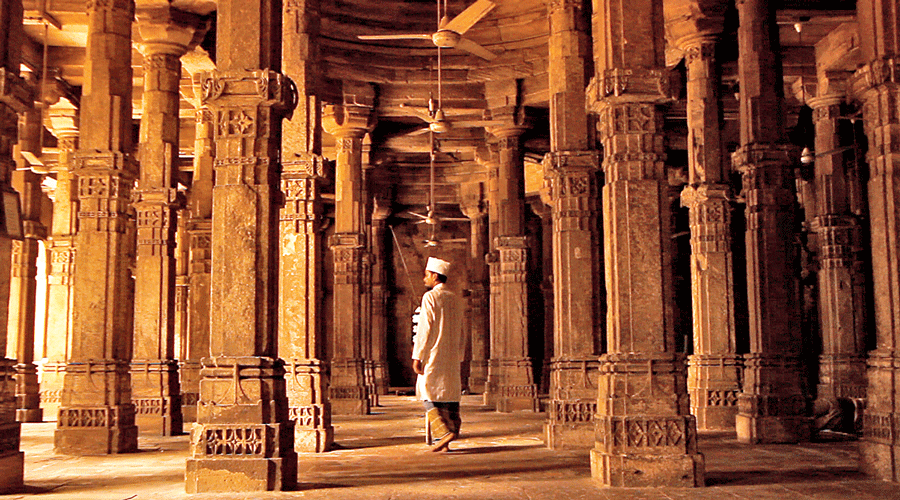A film on the Gujarat riots, which revisits the horrors of 2002 through the eyes of an American and a British victim, was screened in Kolkata on Sunday.
The American, Nishrin Hussain, is the daughter of Ehsan and Zakia Jafri. She moved to the US after marriage in 1983. Jafri, a popular trade unionist, poet and a Congress MP, was among 69 people killed at Ahmedabad’s Gulberg Society on February 28, 2002, a day after the Godhra train carnage.
Imran Dawood, a British citizen of Gujarati origin, was on holiday in the state with his two uncles and a friend when they were attacked on the same day. While the others were butchered, Dawood survived with injuries.
The film, Even the Crows: A Divided Gujarat, which came out in 2014, is directed by Sheena and Sonum Sumaria, sisters and British filmmakers of Gujarati origin.
The film derives its name from a Hindi poem by Jafri that it opens with.
An English translation reads like this: "Neither the leaders nor protectors came to his rescue. He was chased down the street, daggers in their hands. When he knocked on the kind people's doors, he found his slayers. We worshipped the sun and moon at home; worthless rocks they turned out to be. His corpse lay rotting on the street; even the crows turned out to be better than humans".
Over the next 75-odd minutes, the filmmakers travel through India, the UK and US, speaking with Nishrin, Dawood and others — people on Narendra Modi’s bandwagon as well as his opponents — to provide an intimate insight into the rise of Hindutva and the ongoing search for justice of the victims of the 2002 Gujarat pogrom, both within India and among its diaspora.
Modi, then the chief minister of Gujarat is shown to be in the midst of his national election campaign despite facing serious allegations of complicity in the riots. A lot of time has passed since. On June 24 this year, the Supreme Court upheld a special investigation team’s clean chit to Modi, now Prime Minister, and 63 others over the 2002 riots, dismissing a plea from Ehsan Jafri’s wife Zakia who had alleged a larger conspiracy.
According to witness accounts, Zafri was dragged out of his home by a mob and mutilated before being set on fire.
In the film, Nishrin fights hard to hold back her tears while talking about her father.
"He was a person who loved people and understood pain," Nishrin describes Zafri at the start of the film.
She did not believe the news of her father's death.
"I had this feeling that my dad had survived. Somehow I had this feeling that he loved me so much that he would have somehow saved himself for me. He knew how much painful it would be for me to find out. Because we found my mother (alive). I kept thinking for the longest time...There are times when I am in Ahmedabad, I look at the streets. Maybe he has lost his memory but he is somewhere. When you don't find a body... when you don't have those last minutes, you have these crazy thoughts," she said.
Dawood was in India for the first time in February 2002. "My two uncles, my next-door neighbour... we planned a visit to India. We had so much expectations. We heard so many stories about India. How great it was," he said.
They were headed to Gujarat from Agra where they went to see the Taj Mahal. They ran into "police barricades, buildings on fire and smoke on the horizon". As their car was chased by a mob, Dawood and others ran towards a nearby farmhouse.
"We were pleading for our lives. They were asking us if we were Muslims. They had sticks, knives and all different kinds of weapons. One guy said in Gujarati that it was time to take our trousers off and see if we were circumcised. That is how sick these people were," he said.
Towards the end of the film, both Nishrin and Dawood are asked if they would want to go back to India.
"I would like to go back and hopefully make a change and try to help people... Maybe doing this will help me and my family," he says.
Nishrin also answers unequivocally: "There is nothing that can deter me from going back to Gujarat. If I have to move back, it has to be Ahmedabad. My dad's ashes are there".
The film was screened at Sujata Sadan by People's Film Collective, an independent, people-funded body.
"These are difficult times. There is an orchestrated attempt to rewrite our history. People are being sent to jail for filing PILs seeking justice for the oppressed. Films like this resist those attempts. Lest we forget the past," said Dwaipayan Banerjee, among the founding members of the collective.
The screening was followed by an address by rights activist Sujato Bhadra. He talked about Teesta Setalvad, Mohammed Zubair and other activists "targeted" by the government.
"There is a chilling pattern in the State going after journalists and activists, who are sentinels of human rights," said Bhadra.
